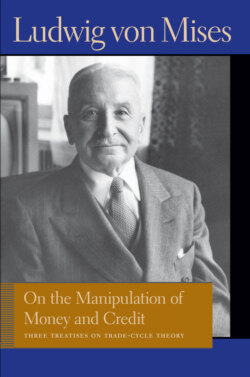Читать книгу On the Manipulation of Money and Credit - Людвиг фон Мизес - Страница 21
На сайте Литреса книга снята с продажи.
VI The Inflationist Argument 1. Substitute for Taxes
ОглавлениеNowadays, the thesis is maintained that sound monetary relationships may certainly be worth striving for, but public policy is said to have other higher and more important goals. As serious an evil as inflation is, it is not considered the most serious. If it is a choice of protecting the homeland from enemies, feeding the starving and keeping the country from destruction, then let the currency go to rack and ruin. And if the German people must pay off a tremendous war debt, then the only way they can help themselves is through inflation.
This line of reasoning in favor of inflationism must be sharply distinguished from the old inflationist argument which actually approved of the economic consequences of continual monetary depreciation and considered inflationism a worthwhile political goal. According to the later doctrine, inflationism is still considered an evil although, under certain circumstances, a lesser evil. In its eyes, monetary depreciation is not considered the inevitable outcome of a certain pattern of economic conditions, as it is by adherents of the “balance of payments” doctrine discussed in the preceding section. Advocates of limited inflationism tacitly, if not openly, admit in their argumentation that paper money inflation, as well as the resulting monetary depreciation, is always a product of inflationist policy. However, they believe that a government may get into a situation in which it would be more advantageous to counter a greater evil with the lesser evil of inflationism.
The argument for limited inflationism is often stated so as to represent inflationism as a kind of a tax which is called for under certain conditions. In some situations it is considered more advantageous to cover government expenditures by issuing new notes, than by increasing the burden of taxes or borrowing money. This was the argument during the war, when it was a question of defraying the expenses of army and navy. The same argument is now advanced when it comes to supplying some of the population with cheap foodstuffs, covering the operating deficits of public enterprises (the railroads, etc.) and arranging for reparations payments. The truth is that inflationism is resorted to when raising taxes is considered disagreeable and when borrowing is considered impossible. The question now is to explore the reasons why it is considered disagreeable or impossible to employ these two normally routine ways of obtaining money for government expenditures.
